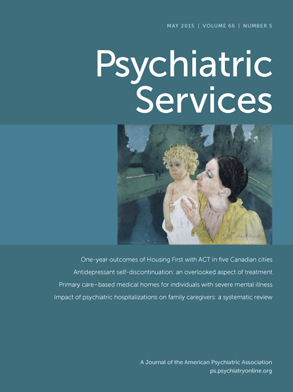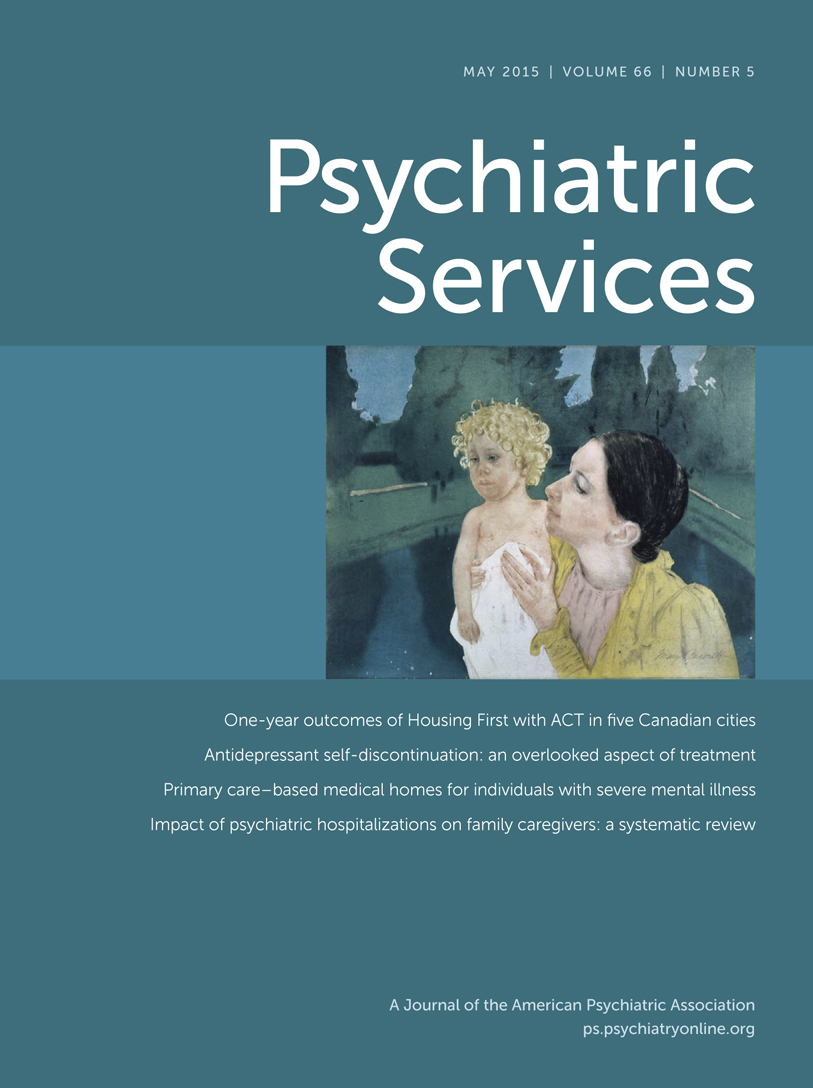In this issue of Psychiatric Services, Samples and Mojtabai address a key topic that is commonly hidden from physicians: the discontinuation of antidepressants without physician advice. Although it has been known for many years that a substantial fraction of patients discontinue antidepressants without physician advice during the first few months of treatment, little clinical and academic attention has been devoted to identifying patients at high risk for premature antidepressant termination. Progress in this area helps physicians focus on high-risk patients.
When confronting many clinical challenges, clinicians fall back on familiar skills and sources of knowledge. Matching specific treatments to individual patients, for example, may be informed by a detailed assessment of the patient’s clinical presentation, sensitivity to treatment preferences, an understanding of the patient’s past treatment responses, familiarity with the treatment responses of patients with similar symptoms, knowledge of basic pharmacological principles, and a grasp of the literature on antidepressant efficacy and side effects. But what skills and knowledge do we draw upon to evaluate risks of self-discontinuation of antidepressants?
A logistical challenge to developing a clinical understanding of antidepressant self-discontinuation arises from its frequent co-occurrence with treatment termination. Because patients who discontinue medications without physician advice commonly leave treatment, treating physicians are frequently deprived of an opportunity to learn about the factors that contributed to their patients’ decisions. There are few occasions to learn how doubt developed in the patient’s mind concerning the value of antidepressant treatment, what eventually tipped the balance against continuing treatment, and why the issue was not raised in treatment. Was it because the patient no longer felt the need for medication and could handle problems on his or her own? Were expectations of prompt relief frustrated by the delay in onset of therapeutic benefit? Were side effects intolerable? Which ones?
Epidemiological research, such as the new study by Samples and Mojtabai, as well as clinical trials that assess individuals without regard to their continuity of treatment, can provide a valuable window into patterns of antidepressant self-discontinuation. Only by comparing the characteristics and treatment experiences of patients who do and do not continue prescribed antidepressants can we hope to gain insight into these important issues.
A more nuanced understanding will likely require research designs that are specifically focused on premature antidepressant treatment discontinuation. Depression is associated not only with high rates of early discontinuation of antidepressants but also with nonadherence to various other medical recommendations. Features of depression, including pessimism, hopelessness, and fatigue, may sap an individual’s motivation to adhere to medical treatments. Depression may also undermine medication adherence by amplifying perceptions of risks associated with medication use.
Another important facet of antidepressant nonadherence involves aspects of the clinical relationship. The strength of the therapeutic alliance and level of trust that develops between patients and their prescribing physicians may weigh heavily in patients’ decisions concerning continuity of antidepressant treatment. In the care of patients at high risk of early discontinuation, it may be important to encourage them to freely discuss their positive and negative experiences with antidepressants, perform brief assessments of antidepressant adherence in a nonthreatening manner that does not undermine the alliance, and frame discussions of adherence in the context of optimizing symptom relief and achieving personal treatment goals.
Sometimes patients discontinue antidepressants yet continue in treatment. These situations provide opportunities to gain insights into the processes that drive nonadherence. Unless patients volunteer information about their nonadherence, however, antidepressant nonadherence may easily pass unnoticed. This may lead to unnecessary switches in antidepressant medications, pointless instructions to increase the dose, initiation of unwarranted adjuvant treatments, and misclassification of patients as treatment resistant.
Not all problems with adherence to antidepressant treatment result in complete medication cessation. More subtle forms of antidepressant nonadherence involve taking extra tablets, skipping days, or forgetting doses. Although some progress has been made in characterizing the determinants and consequences of such behaviors among patients with schizophrenia prescribed antipsychotics, much less attention has been devoted to analogous behaviors with respect to antidepressants in depression and anxiety disorders.
As Benjamin Franklin once aptly remarked, “The doorstep to the temple of wisdom is knowledge of our ignorance.” When it comes to patients who self-discontinue antidepressants, we can easily underestimate our own level of ignorance. Without a sense of humility, we run the risk of assuming that we can simply intuit when our patients are preparing to stop or have recently stopped their antidepressant medications. The new report by Samples and Mojtabai serves a critical function by supplementing clinical intuition with objective data on risk factors for antidepressant self-discontinuation.

